Heartland of the Industrial Revolution and home to some of the country’s most beautiful landscapes, the North West of England is a varied regional area. The North West is the third-most-populated region in the United Kingdom, after the South East and Greater London and its south is largely urban, being home to the dynamic cities of Liverpool and Manchester. To the north lies some of England’s most stunning countryside, including the Lake District and Lancashire Pennines.

Economic history
Early industrialisation brought canals and the silk industry before the cotton industry acted as catalyst for the rise of the famed industrial cities of Manchester and Liverpool.
The industrial revolution developed round Manchester. The region became famous in the 18th century for cotton spinning and weaving, and cotton mills and factories dotted the Lancashire landscape. As cotton trade grew, mill towns grew around the whole region.Liverpool’s unique location: ideally situated on the mouth of the river Mersey, at the point where it meets the busy shipping lanes of the Irish Sea, enabled it to become the north of England’s leading port.
Cumbria has a long heritage in mined iron core, lead and silver. This mining and the mining for coal has mainly stopped but some steel is still made in south Cumbria.
Current economy
Today, North West England accounts for 10% of the UK’s GDP and the region is reshaping its economy, with activity in financial services, technology, media and telecom and cyber security.
There are three specific areas picked for growth in Manchester’s city strategy, says Richard Bell, managing partner for UK financial advisory at Deloitte: healthcare innovation, advanced materials innovation and ensuring it’s a digital city. “And the M&A markets reflect those three things that local government is focused on. There’s a mirroring of where the investment is going at a government and private level.”
In November 2022, Stephen Rotherham, Metro Mayor of the Liverpool City Region,
announced a landmark partnership and action plan with Innovate UK, aimed at accelerating business innovation and reflecting the city region’s highly developed approach to innovation and world-leading capabilities.
“Locally, we’re putting our money where our mouth is too, with plans to invest 5% of GVA into R&D and plans that could create around 44,000 high-skilled, well-paid jobs for local people and add $42bn to the local economy”
ICAEW North West region Chair, Steve Stuart concluded “This summit really demonstrates the progress the City Region is making; innovation is the key to economic growth and success over the next 7 years. It is really amazing to see so many significant projects coming together across the city region. This environment provides SMEs with a real opportunity to get on the growth journey and flourish over the next few years.”
Economic Outlook
Business confidence in the North West’s SME community has increased in the second quarter of 2023 and now sits about the national average. According to new research from Capify, business confidence in the North West has risen as a result of improved trading performances over the first half of the year.
Capify’s Q2 2023 SME Business Confidence Survey revealed that 40% of SME owners in the region reported an increase in turnover between April and June, whilst just under one in three saw their profits increase in the same period.
The overwhelming majority – 80% – of North West SME owners expect turnover to grow over the coming year, with 53% expecting profits to grow over the same period. This improved confidence in operating conditions, means that 47% of firms are planning business expansion over the next 12 months.
These findings are echoed by other current research. According to the Institute of Chartered Accountants’ (ICAEW) Q2 2023 Business Confidence Monitor (BCM) business confidence has strengthened in the North West, and now stands notably above both the region’s historical norm and the UK average.
Yet, according to the ICAEW, this confidence is likely to be frail, as companies and consumers continue to be impacted by a challenging economic period, with high inflation and interest rates.
Indeed, alongside this improvement in the region’s business confidence, Capify’s survey also revealed that continuing inflationary pressure is placing a significant strain on SME owners’ cash reserves, with 47% of respondents reporting they were concerned about the level of cash in their bank accounts.
Concerns around cash reserves are undoubtedly accentuated by issues related to cash collection. Nearly one in four owners (24%) stated that they were worried about unpaid invoices, and the survey found that the average amount of money owed to SMEs in outstanding invoices was £46k.
John Rozenbroek, COO/CFO at Capify, said: “Our latest survey findings underline the vibrancy and resilience that exists in the North West’s SME community. As a Manchester-based business ourselves, we know how important a role SMEs play in the regional economy. But The Confidence Survey findings also reflect what we see and hear every day – that SMEs are struggling to keep ahead of the challenges caused by this extended period of inflation and the impact it has on market dynamics”.
You can find out more about how Capify can help your business make the most of regional growth opportunities and see how much you might be eligible to borrow by clicking here.
Alternatively, you can speak to one of our advisors on 0800 151 0980.


